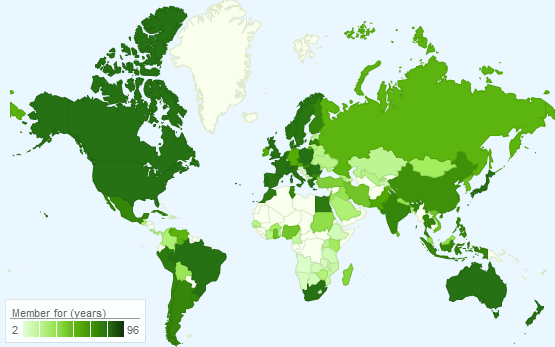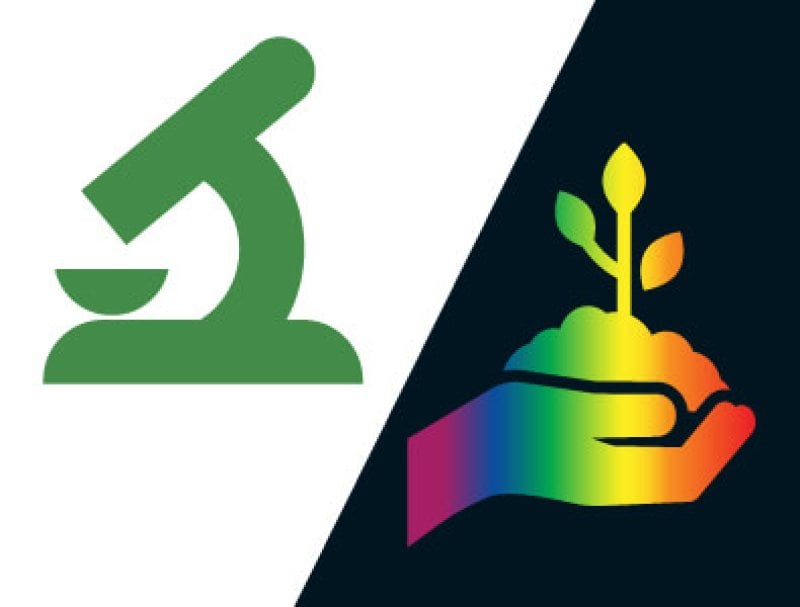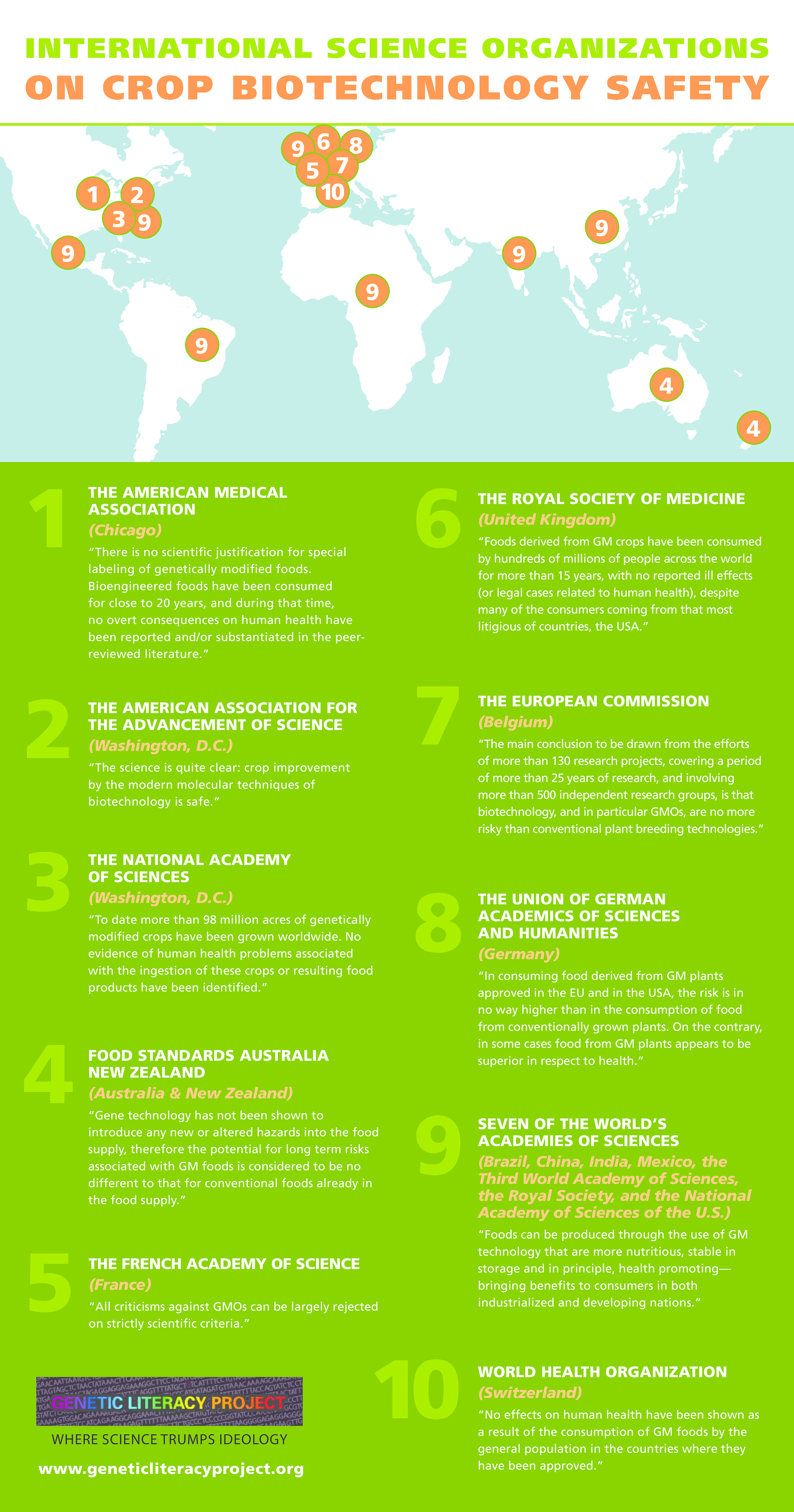In addition, there is also extensive literature that compiles the socioeconomic and environmental benefits that transgenic crops have reported in two decades of commercialization [9,10].
This document brings together the public statements of technical and scientific institutions that adhere to this consensus. I made an update based on this document from ChileBio that initially included 40 official documents representing about 190 institutions – the document from ChileBio was subsequently updated in 2017 with the institutions and statements attached here.
The update shows that 284 technical and scientific institutions recognize the safety of GM crops and their potential benefits. Interestingly a large part of these institutions are located in Europe, the continent that has put more obstacles to the commercialization of these crops. On the other hand, the countries with most organizations in favor of GM crops are United Kingdom (33), United States (25), Italy (23), Spain (16) and Germany (11).
Final number
After categorizing the different institutions from Africa (14), Asia (5), Europe (89), Latin America (8), North America (28), Oceania (7) and internationals (15), a total of 166 institutions was obtained. If we add the 101 academies and 27 scientific unions that signed the document of the International Council for Science (ICSU), we get a figure of 294 institutions.

However, in the current 121 national scientific institutions that are members of ICSU, 13 already appear on the categorization by continents – the academies of sciences of Australia, Brazil, Cameroon, Chile, Czech Republic, France, India, Kenya, Ghana, Vatican, Mexico, UK and United States, and these academies where members of ICSU before the document was signed in 2003. Therefore, if we subtract these 13 members, we get a figure of 281 institutions.
But we must note that the European Academies Science Advisory Council (EASAC) is composed of 29 members, and 26 already appear on the categorization by continents or in the declaration of ICSU. So we must add the 3 remaining institutions (ALLEA, ‘Croatian Academy of Sciences and Arts’, and the ‘Spanish Royal Academy of Sciences’) adding a final figure of 284.
In conclusion, 284 technical and scientific institutions recognize that GM crops are not riskier than those produced by conventional breeding, and/or the potential benefits of these crops.
References
- European Commission, 2010. A decade of EU-funded GMO research (2001 – 2010). Available in: http://ec.europa.eu/research/biosociety/pdf/a_decade_of_eu-funded_gmo_research.pdf
- Nicolia et al. (2013). An overview of the last 10 years of genetically engineered crop safety research. Critical Reviews in Biotechnology, 34 (1): 77-88
- Bundesministerium für Bildung und Forschung (BMBF), 2014. “25 Jahre BMBF-Forschungsprogramme zur biologischen Sicherheitsforschung”. Available in: http://www.bmbf.de/pub/Biologische_Sicherheitsforschung.pdf
- Van Eenennaam et al. (2014). Prevalence and impacts of genetically engineered feedstuffs on livestock populations. Journal of Animal Science, 92 (10): 4255-4278
- Information Platform for Animal Health and GM Feed (IPAFEED), 2015. Available in: http://www.ipafeed.eu/
- National Academies of Sciences, Engineering, and Medicine. 2016. Genetically Engineered Crops: Experiences and Prospects. Washington, DC: The National Academies Press. doi: 10.17226/23395.
- Biology Fortified, 2014. “New resource shows half of GMO research is independent” (2014). GENetic Engineering Risk Atlas (GENERA). Available in: http://www.biofortified.org/2014/08/announcing-the-launch-of-the-genera-beta-test/
- Sánchez, M. (2015). Conflict of interests and evidence base for GM crops food/feed safety research. Nature Biotechnology, 33: 135–137
- Klümper W, Qaim M (2014) A Meta-Analysis of the Impacts of Genetically Modified Crops. PLoS ONE, 9(11): e111629. doi:10.1371/journal.pone.0111629
- GM crops: global socio-economic and environmental impacts 1996- 2015. Graham Brookes & Peter Barfoot PG Economics Ltd, UK. Available in: http://www.pgeconomics.co.uk/pdf/2017globalimpactstudy.pdf
A version of this article appeared at Sí Quiero Transgénicos as “More than 280 scientific and technical institutions support the safety of GM crops” and has been republished here with permission from the author.
Daniel Norero is a biochemistry student and works in the Laboratory of Molecular Plant Pathology at the Catholic University of Chile. He is the founder of the Hispanic biotechnology advocacy movement “Sí Quiero Transgénicos” and also writes for the Chilean Skeptical Association and LatinAmericanScience. Follow him on Twitter @DanielNorero
This article first appeared on the GLP on June 19, 2017.
































